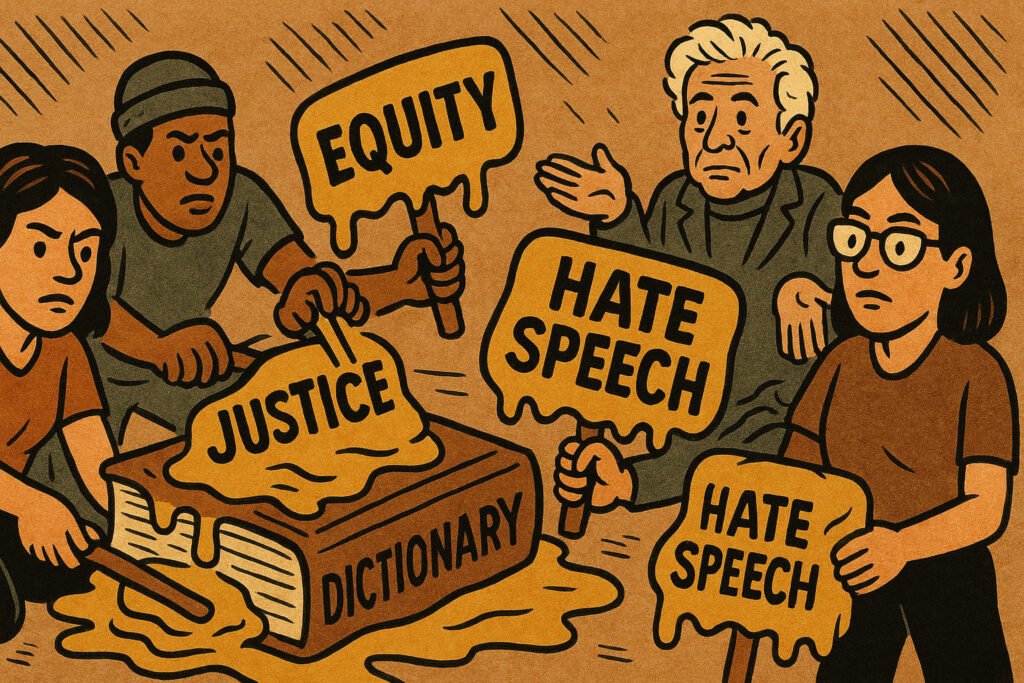Deconstruction – When Meaning Melts Away
Ever had a conversation with someone who says, “Well, it’s all a construct”? Congratulations — you’ve met deconstruction in action.
Born in the mind of French philosopher Jacques Derrida, deconstruction claims that language can never give us fixed meaning. Every word, every text, every idea? Always unstable, always open to endless reinterpretation.
Sounds clever. In practice, it means: nothing means anything unless an activist says so.
Table of contents
Buzzword Breakdown
- Deconstruction → Tearing down meaning until only “interpretations” remain.
- Texts → Anything from Shakespeare to a cereal box.
- Endless Play of Meaning → Fancy phrase for “we’ll never agree what words mean.”
- Binary Oppositions → The good/bad, male/female, true/false contrasts postmodernists love to dismantle.
What Deconstruction Really Means
At its core, deconstruction says language is slippery. Words don’t carry fixed truths; they carry traces of other words, shaped by culture, history, and power.
So instead of asking “What does this mean?” deconstruction asks “Whose power does this meaning serve?”
That’s why activists can declare yesterday’s common sense today’s “hate speech.”
👉 For the bigger picture, see: Postmodernism – Why Truth Went Missing.
How It Works in Practice
- Literature: Professors “deconstruct” books to show how every story secretly reinforces oppression.
- Law: Legal scholars argue that justice itself is just a construct — so rulings should be reinterpreted endlessly.
- Gender & Identity: If words have no fixed meaning, then “man” and “woman” are just social scripts. Cue gender theory.
- Politics: Every policy becomes about “narratives” rather than facts.
The Business of Deconstruction
Like all good academic fads, deconstruction spawned an industry:
- University seminars teaching students how to find oppression in Shakespeare.
- Activist toolkits redefining words on the fly to win arguments.
- HR manuals filled with rebranded jargon that nobody dares question.
Confusion became a career path.
The Irony
Deconstruction was supposed to liberate us from rigid meanings. Instead, it created a dictatorship of ambiguity.
When words mean whatever someone powerful says they mean, you don’t get freedom — you get manipulation.
Why It Matters
- Destroys clarity — debate collapses when meaning is endlessly deconstructed.
- Empowers elites — only the “experts” get to say what words mean today.
- Fuels woke ideology — if nothing is fixed, then identity, truth, even biology are up for grabs.
Deconstruction is less philosophy, more toolkit for permanent activism.
Conclusion
Deconstruction might sound sophisticated, but at heart it’s a linguistic magic trick: pull the rug of meaning out from under everyone, then declare only your interpretation counts.
It’s the intellectual keystone of postmodernism, and the reason “truth” today feels optional.
When every word can be deconstructed, the only thing left standing is power.
FAQ
What is deconstruction in plain English?
A way of saying words never have fixed meaning — only shifting interpretations.
Who invented deconstruction?
French philosopher Jacques Derrida in the 1960s.
Why is it linked to postmodernism?
Because deconstruction embodies the postmodern suspicion of truth. See: [Postmodernism – Why Truth Went Missing].
How is deconstruction used today?
In activism, HR, and academia — to redefine language on the fly.
Why does it matter for woke politics?
Because if words mean nothing stable, activists can endlessly rewrite reality.



